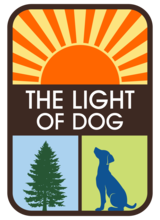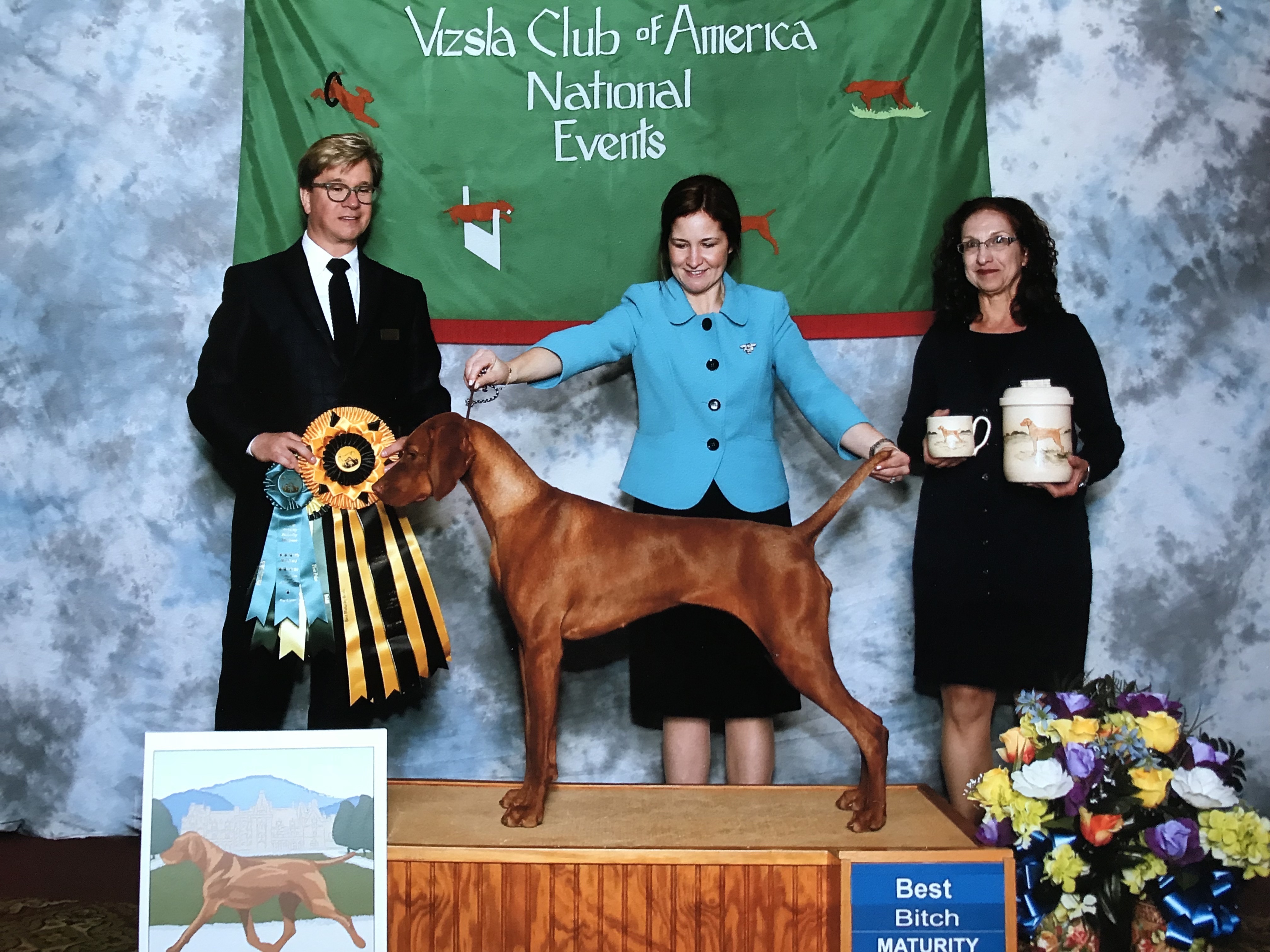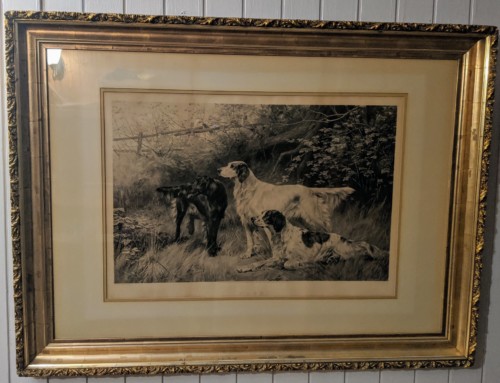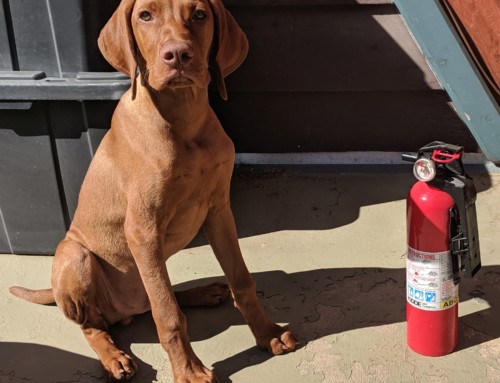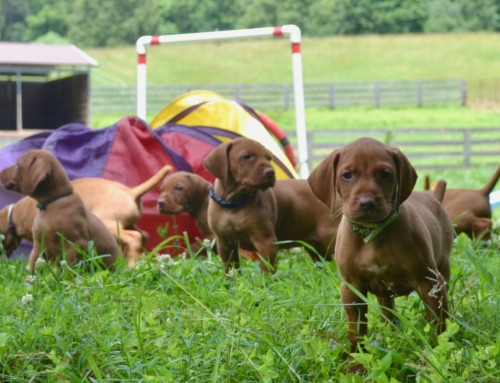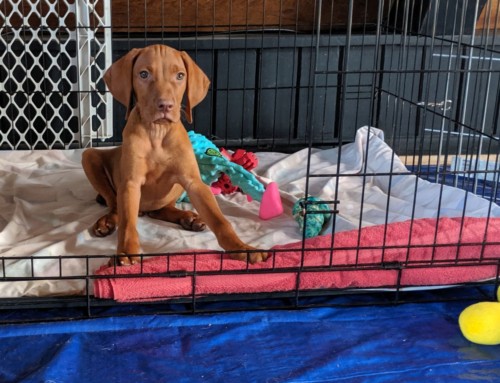DOG TRAINING OFFERED IN-PERSON AND ONLINEOur dog training services are delivered in almost any format that meets your needs. We have GROUP CLASSES at our indoor and outdoor facilities on our farm, ONLINE LIVE STREAMING classes, and SELF-PACED VIDEO-BASED training through our Online Dog Training Course. Our PRIVATE TRAININGS can be done in-home, outside, in public dog-friendly locations, at our facility on our farm, online via phone or video conferencing and through email. |
In this post, we interview a reputable breeder so our readers can get an idea of what a reputable breeder looks like and how they differ from “backyard breeders” or puppy mill breeders. In our research for our next dog, we chose the Vizsla breed. For those familiar with us already, you have heard and seen many stories and photos of our beloved Romeo, our first Vizsla.
In searching for the right breeder for us for our next Vizsla, we found Karen. In this post we interview Karen of Firelight Vizslas (https://www.firelightvizslas.com/) in North Carolina. We feel that Karen was the best fit for us, even though she is in North Carolina and we are in Colorado. We are willing to travel to find the right breeder who can provide us with the best dog for us.
Welcome, and thanks, Karen! Let's start right in:
You breed Vizslas. How long have you had this breed? Why did you choose this breed?
I got my first Vizsla in the 1980's to train for Search and Rescue work. With their intelligence and high drive, and short coat they were well suited to this task, in hot humid South Florida.
How long have you been breeding Vizslas, and what made you decide to start breeding?
It was not until I was retired that I got my 3rd Vizsla, Ember, to be my trail partner in 2009. My Breeder Showed in Conformation Dog Shows and I decided to give that a try, and the rest as they say, is history. It was something fun I could do with my dog, I enjoyed the people I met in the Breed and spending time with them at area Dog Shows. I Owner Handled Ember to her Bronze level Grand Championship.
Ostensibly the purpose of Showing Dogs is to determine the ones who meet our Breed Standard and are worthy of breeding. When she was 3 years old I bred my first litter with her.
For people not familiar with this breed, can you tell us a little bit about them?
The Vizsla or Hungarian Pointer is a Sporting dog bred to Hunt feather and fur – typically quail, pheasant, chukkar and rabbits. They are a highly intelligent, versatile dog – the first Quintuple Champion in AKC History was a Vizsla.
Dogs I have bred are Service Dogs, Champion Show dogs, and many other titles in Rally, Obedience, Agility, Trick Dog, Stunt Dog, Lure Coursing, Barn Hunting and even one with a Farm Dog Title. The AKC offers many different activities that you can pursue titles in with your dog, and the Vizsla is probably game to try any of them!
Who would be a good fit for a Vizsla and who would not?
The Vizsla is a high energy dog and needs DAILY exercise. By this I do not mean just a walk around the block, or being put outside in a backyard. Ideally your Vizsla needs an hour minimum each day of supervised off leash time to run, sniff and explore, to play with other dogs, or to train with you on something mentally and physically tiring.
If they get this level of exercise daily, they can be relaxed and suitable household companions. Vizslas thrive in homes with active outdoorsy type people, or having a job to do – training for Agility or Nosework for example.
Also be careful of kennels who Hunt and predominantly do Field work with their dogs and focus on breeding high drive dogs to other high drive dogs. This results in dogs who do not have an “off” switch and typically do not make good family pets.
How often do you have litters and what criteria do you use when deciding to have another litter?
I averaged less then one litter per year for my first 8 years. I am now on my 3rd generation of Vizslas, and thus have more dogs out there worthy of breeding and I will have 2 litters this year.
I still actively Show, and my dogs have had some nice success in the ring. So my priorities are first Health and Temperament, and then striving to attain that perfect vision of the ideal Vizsla per our breed standard. I do all recommended health screenings – OFA hip xrays, Cardiac and ophthalmic screenings, thyroid testing, and more, such as elbow xrays.
We have both cancer and epilepsy in our breed which cannot be tested for, so it is essential to find a Breeder who is actively involved in the Breed – Showing, competing in other activities, and who are members of the National and local Breed Clubs and agree to abide by their Code of Ethics. Getting out and competing with their dogs is where they meet other Breeders and learn about the health issues of individual dogs and in different pedigree lines and the various potential health concerns in any contemplated breeding.
Every Stud dog is not suited for every Dam – conformationally or health wise. These are the important kind of things the average “backyard breeder”, or worse Pet Store Puppy Mill Breeder, do not take into consideration.
Rescue Organizations and responsible Breeders can tell you heartbreaking stories from people who bought puppies that were not responsibly bred – and now their beloved family member needs expensive hip replacement surgery, or suffers from a lifetime of seizures, and the Breeder is never heard from again.
If someone wants a puppy from one of your litters, what is the process you use? How do you determine if someone will get a puppy from you or not?
My passion is natural rearing for optimal good health and longevity of my dogs. So my “niche”, so to speak, within the Breed is for people who are also interested in starting their natural rearing journey with their new family member.
I serve as their Mentor for the life of their dog and send over 75 homework lessons, educating my buyers on how to feed a RAW diet and avoid the need for toxic chemical flea and tick products, neurotoxic heartworm products, and vaccines. Instead, we use an appropriate diet, herbs and homeopathy for vibrant health.
I am on my 3rd generation of naturally reared puppies. For people only interested in raising their puppy conventionally, I steer them to other responsible Breeders who raise their puppies conventionally. I use an application and screening process. I do not request a deposit until the puppies are born and I know how many puppies I have and whom I can accommodate.
What do you think are the criteria people should look for in a reputable breeder?
Sue, there are several great articles on How to Find A Reputable Breeder (and on the subject of why you should want a puppy from a Breeder who Shows, even if you do not want a Show Dog) that already exist, so I would not want to try and reinvent the wheel. I will forward some of them to you and I touched on some of these qualities above.
The shorthand place for someone to start looking for a responsible Breeder is the Parent Club for the Breed they are interested in. Simply do an internet search for Breed X and Parent Club. i.e. mine is the Vizsla Club of America. Every parent Club will have links to regional Clubs in different geographic areas. These local Clubs often have Breeder Referral Chairpersons and have a list of reputable Breeders.
Look for someone who is a Breeder of Merit – this means they have been breeding responsibly for a minimum of 5 years.
What red flags should people look out for with breeders?
There are also great articles already written on various red flags as well. For me these are breeders who do not health test their dogs, breeders who own both the Sire and the Dam and only breed those 2 dogs over and over again, breeders who do not go out and compete with their dogs in any venue – proving they have sound, healthy dogs, with stable temperaments who enjoy doing things.
If they are not members of Breed Clubs – they do not have the knowledge or experience to adequately evaluate pedigrees for potential health issues. I would recommend an AKC registered puppy, avoid all the other various breed ‘registries” like “CKC” the Continental Breed Club which will register any dog if you pay their fees.
Lastly, avoid Breeders who will sell a puppy to you sight unseen, or without ever meeting you; who are willing to ship puppies as cargo (which is different then allowing someone to fly with a puppy in the cabin with them); and who do not have an application or interview process who are willing to sell a puppy to anyone who inquires.
You use Puppy Culture to raise your litters. Can you briefly describe for people what that is and why you use it?
Puppy Culture is a transformational way to raise puppies. I think I was already doing a lot of good things with my first 2 litters – enrichment and socialization, Early Neurological Stimulation, etc. What Puppy Culture did was to confirm what I was doing right, gave me even more good things to do and backed it all up with science, and most importantly, it taught me WHEN to do things appropriate for each developmental stage.
Puppy Culture prepares puppies for whatever adventures their new life will hold. It gives each puppy a great foundation in problem solving, creates enrichment seekers who are easy to train, and gives them the resiliency to bounce back from unexpected things, and the difference between Puppy Culture puppies and puppies just raised in a kennel and sold as soon as they are old enough to eat solid food – is like night and day.
It virtually impacts the quality of every day you will spend with your dog for the rest of it's life. It also takes a lot of time and dedication on the part of the Breeder, and is a great indication of their commitment to raising exceptional puppies. (Avidog is another similar program).
You also feed a raw diet and use natural rearing. Can you tell people a bit about why you do this?
Sadly I feel the Pet Food Industry and the modern Medical/Pharmacological Industry models are failing our animals and have created an epidemic of cancer, and other diseases that have dramatically shortened the lifespan of our beloved dogs.
Feeding a species appropriate RAW food diet is the foundation to natural rearing and the vital good health of your dog. Kibble food, now matter how good the ingredients, has to be cooked at such high heat it destroys all the bioavailablity of the nutrition in the food. It also denatures the fat in the food creating dangerous compounds and contains many chemical preservatives.
Think about the fact that a bag of dog food can sit on the shelf for a year or more and not go rancid!!! In order to bind the ingredients into those little nuggets, all kibble is chock full of carbohydrates such as GMO corn, rice, sweet potato or peas. Each bag of dog food contains 50% or more, sugar! Dogs are simply not designed to eat this kind of carbohydrate load which creates a lifetime of chronic inflammation which creates disease.
Anything else you would like to share or think our readers should know before finding a breeder and bringing home a puppy?
Like most Breeders, I used to send a Puppy Manual home with each family, but soon learned that they were so enchanted by having their new family member, they never got around to reading much of it!
Now instead, I send daily homework lessons helping to prepare my buyers for everything they will need to know to succeed. From the size collars and other equipment to buy, potty training lessons, crate training, ebooks and training courses. Courses and articles in nutrition and health created by Veterinarians.
Buyers have the time to read and research each of these topics and to ask questions well in advance of their puppy's arrival. Even experienced dog owners have raved about how much they learned and how they appreciated alternative ways to care for their dog.
Thank you for taking the time and sharing valuable information with us, Karen! In another post, we will share some further info on how to select a reputable Breeder and what red flags to watch out for.
Our goal is to positively impact the lives of as many dogs and their families as we can, in part through our extensive library of video, infographics and text articles. 
|
